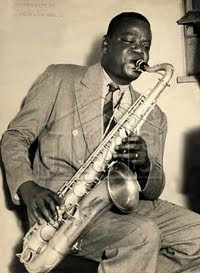Noites Cariocas
 A few weeks ago I got a message from Fernando Gelbard, who is, except a great admirer of the music of Oscar Aleman, also a choro fan. He shared with me three versions of the great tune Noites Cariocas, composed by Jacob do Bandolim.
A few weeks ago I got a message from Fernando Gelbard, who is, except a great admirer of the music of Oscar Aleman, also a choro fan. He shared with me three versions of the great tune Noites Cariocas, composed by Jacob do Bandolim.
Noites Cariocas, which means Cariocan Nights, was composed by Jacob do Bandolim in 1957. It became a standard in choro music and it is nowadays on the repertoire of every choro band. The tune is also strongly related to Jacob do Bandolim, like Tico-Tico No Fuba which belongs to Zequinha de Abreu and Carinhoso to Pixinguinha. Remember that playing choro music is a social event. A rodas de choro is a meeting of musicians, who want to play together, and sit in a circle, so they can see each other and make eye contact if necessary. When the musicians want to play, one of the solo instruments starts playing ( the clarinet or bandolim) and the other instruments fill in. If you have an instrument and you like to join the roda de choro, do so - that are some unwritten rules.
 It will be clear that in these spontanious improvisations, well known tunes, like Noites Cariocas are used - tunes every participant, skilled or starter, can use as a steppingstone for their musical interactions. In fact this kind of improvisations have the same roots as jazz music and that's what I like in choro music.
It will be clear that in these spontanious improvisations, well known tunes, like Noites Cariocas are used - tunes every participant, skilled or starter, can use as a steppingstone for their musical interactions. In fact this kind of improvisations have the same roots as jazz music and that's what I like in choro music.
Eu (Ederson Moares)
 It will be clear that in these spontanious improvisations, well known tunes, like Noites Cariocas are used - tunes every participant, skilled or starter, can use as a steppingstone for their musical interactions. In fact this kind of improvisations have the same roots as jazz music and that's what I like in choro music.
It will be clear that in these spontanious improvisations, well known tunes, like Noites Cariocas are used - tunes every participant, skilled or starter, can use as a steppingstone for their musical interactions. In fact this kind of improvisations have the same roots as jazz music and that's what I like in choro music. Fernando pointed me to three fragments - I will share two of them. You'll see Yamandu Costa and Armandinho in duet and Armandinho and Raphael Rabello playing Noites Cariocas. The third fragment I found and is played by a young guitar player and simply named himself, unpretentious, Eu, which means Me or I His name could be Ederson Moares, as he posted the fragment.
Enjoy it.
Armandinho and Raphael Rabello playing "Noites Cariocas" by Jacob do Bandolim (Jacob Pick Bittencourt) (1918-1969)
Eu (Ederson Moares)
Hans Koert



1 Comments:
Thank you, Hans, for this great contribution. Also thank you to Fernando Gelbard for sharing the great video fragments inserted. The tune 'Noites Carioca' definitely is a 'standard' in choro, a great example of the influence of Jacob do Bandolim among choroes.
Jo
Post a Comment
<< Home